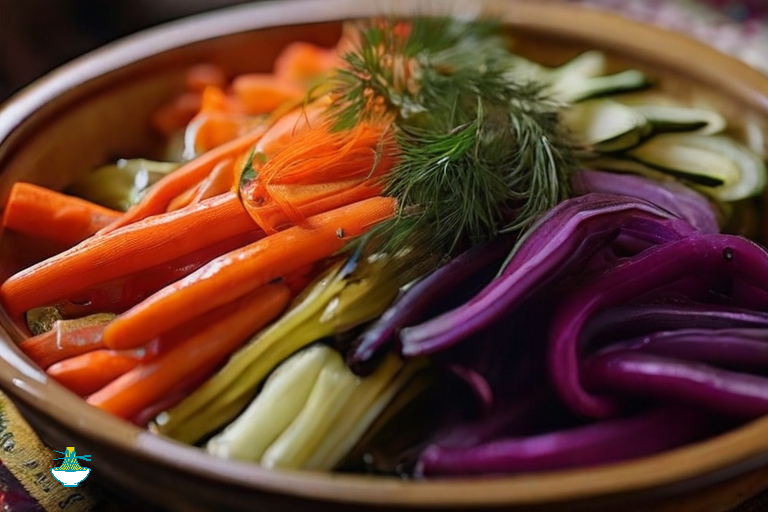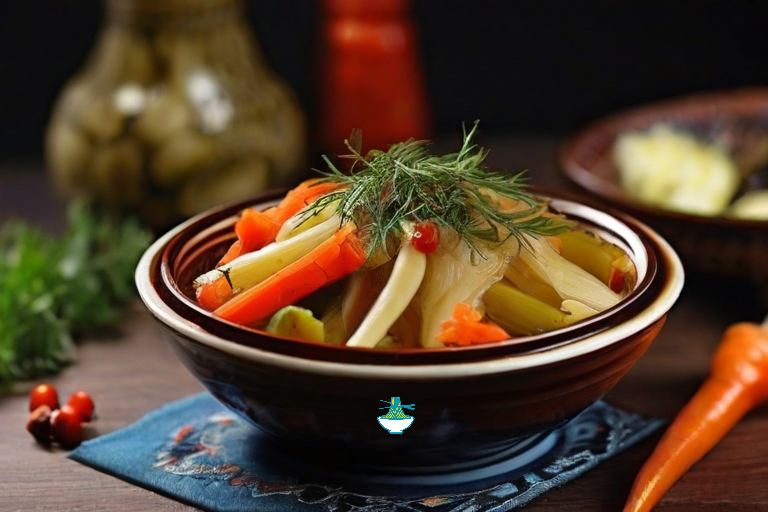Welcome to the vibrant world of Azerbaijani cuisine, where rich history and diverse cultural influences converge to create a tapestry of delightful flavors. In this culinary exploration, we delve into the art of Turshu, a traditional pickling technique that has been perfected over generations in the heart of Azerbaijan. The Azerbaijani people have mastered the craft of preserving seasonal bounty, transforming humble vegetables into tantalizing bites that burst with a harmonious blend of tanginess, spices, and herbs.
Turshu, the Azerbaijani term for pickles, goes beyond being a mere condiment; it is a culinary tradition that reflects the resourcefulness and ingenuity of Azerbaijani cooks. From crunchy cucumbers to vibrant beets, a medley of vegetables is carefully pickled to capture the essence of each season. As we embark on this gastronomic journey, join us in uncovering the secrets behind Azerbaijani Turshu recipes, as we celebrate the marriage of flavors that make this cuisine truly unique. Get ready to tantalize your taste buds and elevate your culinary skills with these time-honored recipes that have stood the test of time in Azerbaijani kitchens.
Ingredients:
- 4 cups assorted vegetables (cucumbers, carrots, cauliflower, bell peppers), sliced or cut into bite-sized pieces
- 1 large red onion, thinly sliced
- 4 cloves garlic, peeled and smashed
- 2 cups water
- 2 cups white vinegar
- 2 tablespoons salt
- 2 tablespoons sugar
- 1 teaspoon whole black peppercorns
- 1 teaspoon coriander seeds
- 1 teaspoon mustard seeds
- 4-6 fresh dill sprigs
- 2 bay leaves
Instructions:
Prepare the Vegetables: Wash and prepare the vegetables of your choice. Ensure they are cut into sizes that suit your preference for bite-sized pickles.
Create the Brine: In a saucepan, combine water, white vinegar, salt, sugar, black peppercorns, coriander seeds, and mustard seeds. Bring the mixture to a gentle boil, stirring until the salt and sugar dissolve completely.
Layer the Jar: In a clean, sterilized jar, layer the sliced vegetables, red onion, garlic cloves, fresh dill sprigs, and bay leaves.
Pour the Brine: Carefully pour the hot brine over the layered vegetables in the jar, ensuring that all the ingredients are fully submerged. Leave a small headspace at the top of the jar.
Cool and Seal: Allow the jar to cool to room temperature. Once cooled, seal the jar tightly with a lid and place it in the refrigerator.
Marinate: Let the vegetables marinate in the refrigerator for at least 24 hours before consuming to allow the flavors to meld and intensify.
Serve and Enjoy: Your Azerbaijani Turshu is now ready to be served as a delightful side dish. The pickled vegetables can complement a variety of main courses or stand alone as a refreshing snack.
Experiment with different vegetable combinations and spice levels to tailor the Turshu to your taste preferences. This recipe encapsulates the essence of Azerbaijani culinary heritage, offering a symphony of flavors that will transport your taste buds to the vibrant streets of Azerbaijan.
Nutritional Values:
It's important to note that the nutritional values can vary based on the specific type and quantity of each ingredient. Additionally, the nutritional content of pickled vegetables may be altered during the pickling process. However, here are approximate nutritional values for the individual components based on standard measurements:
Assorted Vegetables (cucumbers, carrots, cauliflower, bell peppers):
- Calories: Approximately 60-80 calories per cup (varies based on specific vegetables).
- Carbohydrates: Varies, but generally 12-15 grams per cup.
- Fiber: Varies, but generally 3-5 grams per cup.
- Vitamins and minerals: Rich in vitamins A and C, potassium, and other nutrients.
Benefits: Rich in vitamins and minerals, provides dietary fiber, antioxidants, and supports overall health.
Red Onion (1 large):
- Calories: Approximately 60 calories.
- Carbohydrates: About 15 grams.
- Fiber: Around 3 grams.
- Vitamins and minerals: Good source of vitamin C, vitamin B6, and folate.
Benefits: Contains antioxidants, anti-inflammatory properties, supports heart health, and provides vitamins C and B6
Garlic (4 cloves):
- Calories: Approximately 16 calories.
- Carbohydrates: About 4 grams.
- Fiber: Around 0.2 grams.
- Vitamins and minerals: Contains small amounts of vitamin C, vitamin B6, and manganese.
Benefits: Known for its antibacterial and antiviral properties, supports immune health, and may have cardiovascular benefits.
Water (2 cups):
- No calories or macronutrients.
Benefits: Essential for hydration, supports bodily functions, aids digestion, and helps maintain overall health.
White Vinegar (2 cups):
- Calories: Approximately 48 calories.
- Carbohydrates: About 2 grams.
- No fat, protein, or fiber.
Benefits: Acts as a preservative, enhances flavor, may have digestive benefits, and is a source of acetic acid.
Salt (2 tablespoons):
- Sodium: Approximately 4,800 milligrams (varies based on specific salt type).
Benefits: Essential for electrolyte balance, nerve function, and fluid balance in the body. However, moderation is crucial.
Sugar (2 tablespoons):
- Calories: Approximately 50 calories.
- Carbohydrates: About 13 grams.
Benefits: Adds sweetness to the pickling brine, enhancing flavor. However, it's important to consume sugar in moderation.
Whole Black Peppercorns (1 teaspoon):
- Negligible caloric value.
- Small amounts of vitamins and minerals.
Benefits: Adds a spicy kick and depth of flavor. May have antioxidant properties.
Coriander Seeds (1 teaspoon):
- Negligible caloric value.
- Small amounts of vitamins and minerals.
Benefits: Contributes a citrusy and slightly sweet flavor. May have anti-inflammatory and digestive benefits.
Mustard Seeds (1 teaspoon):
- Negligible caloric value.
- Small amounts of vitamins and minerals.
Benefits: Adds a pungent flavor and may have potential anti-inflammatory and antioxidant properties.
Fresh Dill Sprigs (4-6 sprigs):
- Negligible caloric value.
- Contains small amounts of vitamins A and C.
Benefits: Adds a fresh, herbal flavor. Dill is a good source of vitamins A and C.
Bay Leaves (2 leaves):
- Negligible caloric value.
- Small amounts of vitamins and minerals.
Benefits: Imparts a subtle, aromatic flavor. May have antimicrobial and anti-inflammatory properties.
Keep in mind that these values are approximate and can vary based on the specific brands and varieties of ingredients used. Additionally, the pickling process may affect the nutritional content, particularly in terms of sodium and acidity.


Comments